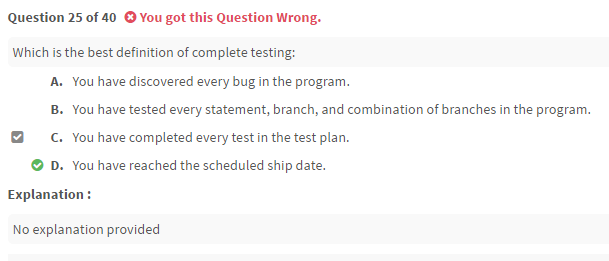This is yet another question that confuses me.
Which is the best definition of complete testing:
- A. You have discovered every bug in the program.
- B. You have tested every statement, branch, and combination of branches in the program.
- C. You have completed every test in the test plan.
- D. You have reached the scheduled ship date.
My answer is C : You have completed every test in the test plan and the reasons are given below.
A. You have discovered every bug in the program.
This is practically impossible. Therefore, it cannot be the answer.
B. You have tested every statement, branch, and combination of branches in the program.
How about non-functional testing etc? Testing every statement,branch and combination of branches cannot be justified as complete Testing.
C. You have completed every test in the test plan.
I assume that all the required test cases are put into a test plan. In that case, after completing every test case, you can say 'I have completed Testing.
D. You have reached the scheduled ship date.
Reaching the scheduled ship date cannot be the definition of complete testing. Reasons are pretty obvious.
However, Test Pot says that the correct answer is D : You have reached the scheduled ship date.
Can anyone help me identify what is the correct answer to this question?
